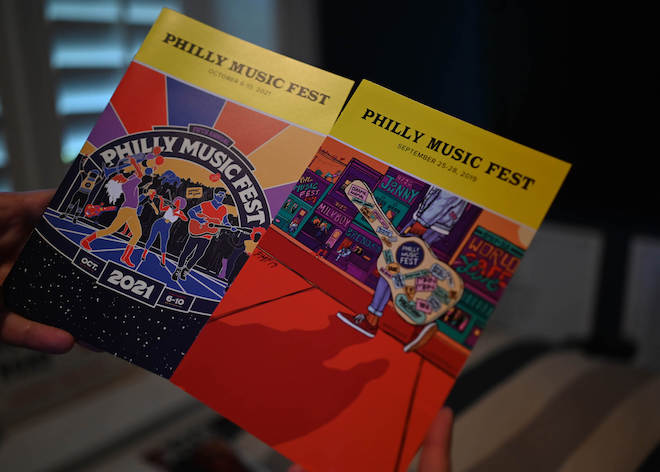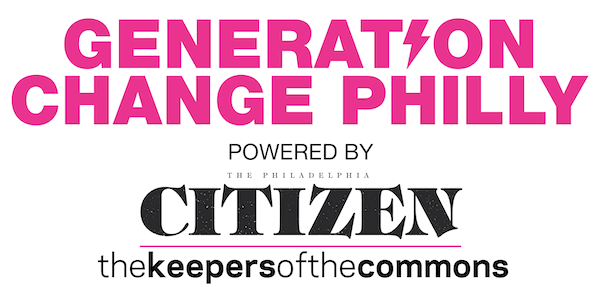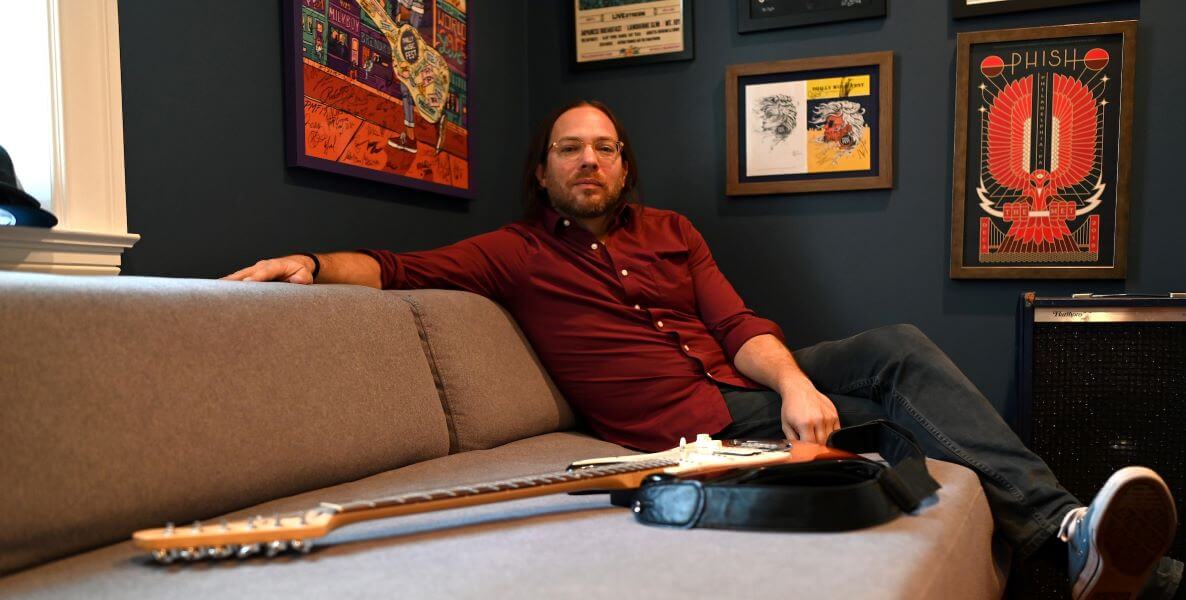What is your earliest memory of hearing live music that moved you?
Greg Seltzer, the founder and producer of Philly Music Fest (PMF) — along with his wife, Jenn — answers almost without hesitation. This born-and-bred Philly area impresario/attorney is a self-described “music nerd” who has written two books on 1960s rock and its relationship to historical events. (He’s the type of music-head who relaxes by mastering deep Bob Dylan cuts on his guitar alone in front of his plants and furniture.)
Seltzer is steeped in music, its history, the current scene, and the importance of nurturing the next generation of musical talent. That’s why he is stewarding his nonprofit music festival — curated shows that can include a mash-up of rock, punk, hip-hop, jazz, folk and pop — into its sixth year, with a goal to raise and donate $100,000 this year to local kids’ music education charities.
“It was the Grateful Dead show on March 19, 1995, at the Spectrum,” says Seltzer, 45, who grew up in Lower Moreland and now lives in Narberth with his wife and two teenage sons. “I’m a huge Dead fan and nerded out on the statistics of when the band played certain songs. That was the show where they played Unbroken Chain live for the first time since they’d recorded it 20 years earlier. I felt like I was witnessing something important. The crowd roared when they heard it. It was special.” Seltzer wants to create a stage for that same kind of magic.
Some people are helpers. They’re simply driven to make change and lift up those around them. Greg Seltzer has spent his career helping and advising others how to do things better. A partner at the law firm Ballard Spahr, Seltzer also has his MBA and is a certified public accountant who specializes in mergers and acquisitions, but he also helps startups and entrepreneurs. He co-founded the Ballard Academy for Student Entrepreneurs, the firm’s accelerator program for student-run startup companies. This summer, he’s also teaching a class at Penn law school, “Entrepreneurship and Startup Law.”
He is one of those people who get things done. Consider that he and his wife organize the PMF all by themselves without staff and, in five years, have raised more than $200,000 to donate to eight core charities (Rock to the Future, LiveConnections (now part of World Cafe Live), Settlement Music School, Musicopia, Play On Philly, Girls Rock Philly, Beyond the Bars, and Philadelphia Youth Orchestra). In the wake of the pandemic, PMF also distributed more than 330 micro-grants to musicians and venues struggling in 2020 and 2021.
For his work conceiving of and organizing the PMF, as well as his efforts to support local musicians and music education, Seltzer is one of our Generation Change Philly, a partnership with the nonprofit Keepers of the Commons to provide educational and networking opportunities to the city’s most dynamic change-makers.
Creating an artist-focused Philly Music Festival
Today, Seltzer announces the lineup for this fall’s music fest running October 10 to 15 with headliners Mannequin Pussy, Low Cut Connie, and a third major band that Seltzer can’t announce yet, but he says, “will sell out the venue for two nights instantly.” Tickets (from $20 to $39) go on sale June 15 for the seven shows at six independent venues. He expects around 3,500 attendees this year, but can reach more fans after shows sell out by live-streaming the concerts.
Listening to Seltzer, it’s striking how smart and sensitive he is to PMF’s goals and mission. He has built his festival differently than the norm. First of all, it’s a 501c3 nonprofit, and its goal isn’t to enrich the festival producers, but the music community as a whole. Seltzer puts the musicians front and center.
“Music fills a spot in my life that other people might fill with exercise, meditation, or therapy,” says Seltzer. “Music has always been what I’ve turned to to get me through any stress and anxiety, ever since high school.”
Seltzer, who also does legal work for the producer of the Newport Jazz Festival and its foundation, has adopted the festival’s sensibility of prioritizing musicians over corporate sponsors. You won’t see any corporate banners flying. (Seltzer does receive support from both big and smaller companies including Independence Blue Cross, Ernst & Young, MVP Capital, and several personal donors, including Jason and Kylie Kelce.)
“The main thing I learned from Newport,” says Seltzer, “is to be an artist-focused festival. Sure, the fans are super important, but we really go out of our way to take care of the bands playing the Philly Music Fest, not just with a payment, but we focus our promotion on the bands and their success, not ours. We make sure they’re well-fed and never thirsty!”
The festival supports the local scene by paying bands more than just a nominal fee or expecting them simply to be grateful for the opportunity. PMF also supports independent venues (Ardmore Music Hall, World Cafe Live, Johnny Brenda’s, MilkBoy Philly, REC Philly, and Underground Arts) and pays them well, too; in turn, they do the heavy lifting with the practicalities of putting on the shows. This arrangement leaves Seltzer, the festival producer, to focus on branding, fundraising, booking and scouting bands.
Philly Music Fest also serves the public, giving music fans the opportunity to preview local up-and-coming bands as well as established headliners from the region that have made it big. The simple beauty of this festival design is that the funds raised don’t go back to the Seltzers, who work for free, but into supporting educational organizations that lift up the next generation of musicians.
Seltzer believes these young musicians who are being supported will be the artists he will be booking 10 years from now. It is a savvy, ever-replenishing construction to boost and build the cycle of creators who enrich the arts scene, which in turn make the city a more desirable place to live and invest in. It’s the kind of festival built by someone who has law, business, and accounting degrees and a passion for music. In the business world, it would stand out as a “frictionless” design to maximize results.
Seltzer, who specializes in providing legal counsel to business startups, notes the similarities with the music scene. “Bands are like little startup companies. They share a similar grit and ethos,” he says. Seltzer launched “Inside Hustle,” a series of panel discussions that run during the festival to help musicians navigate the business side of the music industry. “I’d mentioned to a few bands what I do,” recounts Seltzer. “They said, We’d love your help. I was happy to review contracts. They said to me, This is the advice we need. It’s the biggest black hole in our lives as musicians.”

The right time, right place
Seltzer tapped into his professional network and brought in accountants and lawyers who do entertainment and copyright law to discuss everything from forming an entity for tax purposes to how to maintain control of their art while among corporate conglomerates.
Seltzer cares deeply about music and those who create it. Why? “Music fills a spot in my life that other people might fill with exercise, meditation, or therapy,” says Seltzer. “When I was studying for my CPA exam it was a super stressful time. The same with law school. Music has always been what I’ve turned to to get me through any stress and anxiety, ever since high school.”
Relatable, right?
Seltzer says that this stage of his life just seemed the right time to put on a festival now that he’s secure at his job, married with two kids, everyone is good and healthy, and he’s amassed the skills to give back to the music that supported him through stressful times.
And, with public funding for music programs in school evaporating, Seltzer knew where he and his wife wanted to put their support. “How will kids learn music if we don’t cultivate this generation?” he asks. “The genesis of the festival was that we needed education now in middle and high schools.”
“What we’ve tried to do with PMF is to affect lives in different ways: giving musicians a stage and the fans who come to see PMF a great show that will in turn affect the lives of kids who get tutoring and instruments,” he says. “My whole career has been about giving advice to people, and I hope it’s good and impacts them. It’s kind of what I’ve spent my life doing.”
Rock to the Future is one of PMF’s charitable beneficiaries and works with about 500 kids each year providing life skills to support current and lifelong wellbeing through free, student-driven music programs. It has not only received funds to expand its programs from PMF, but has benefited from visibility the platform has provided. Jessica Craft, CEO of Rock to the Future, says, “We really appreciate the financial support and the publicity. It’s incredibly valuable and helps bring in more volunteers and donors.”
Craft remembers the thrill of going up on stage to introduce one of the headline acts. “It was a great opportunity to give a quick plug for Rock to the Future to a packed room at World Cafe Live,” she says. “It’s great to share that energy and spread the word.”
Seltzer takes pride in the growth of the bands he’s backed. “When I look at the lineups from past years, other people focus on the headliners,” says Seltzer, “But I like looking at the up-and-coming bands and seeing their growth. Low Cut Connie played in 2018, but returns this year as a headliner. They blew up this year with stories in the New York Times and The New Yorker. I love seeing small bands grow into headliners.”
So what’s on the vision board for PMF? Seltzer isn’t convinced that bigger is necessarily better. Maybe a little bigger, but he also wants to stay true to the smaller venues that are the backbone of the Philly music scene.
“My goal is to maximize money to donate to music education charities,” he says. Seltzer wants to reach the $100,000 goal for donations to music education with the seven shows. He’s considering maybe adding more “bolted on” events to educate working musicians and those in the music business, maybe schedule a children’s concert, or figure out how to get medical insurance for performers. You can practically hear his mind spinning on how to tackle these agenda items.
He takes pleasure in helping Philly’s music ecosystem. “What we’ve tried to do with PMF is to affect lives in different ways: giving musicians a stage and the fans who come to see PMF a great show that will in turn affect the lives of kids who get tutoring and instruments,” he says. “My whole career has been about giving advice to people, and I hope it’s good and impacts them. It’s kind of what I’ve spent my life doing.”
Philadelphia Music Fest, October 10-15, various locations including World Cafe Live, Johnny Brenda’s, Ardmore Music Hall, MilkBoy Philly, REC Philly, and Underground Arts. For tickets, phillymusicfest.com

The Philadelphia Citizen is partnering with the nonprofit Keepers of the Commons on the “Generation Change Philly” series to provide educational and networking opportunities to the city’s most dynamic change-makers.
![]()
MORE FROM THE CITIZEN’S GENERATION CHANGE PHILLY SERIES




